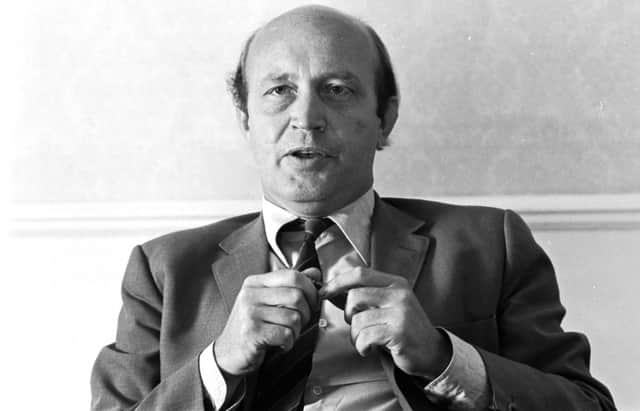Obituary: Iain Somerled MacDonald MacCormick, politician


Although children of political families sometimes make surprising choices – for example the communist writer Lewis Grassic Gibbon’s daughter became a Tory councillor in Welwyn Garden City – there was never any doubt that Iain MacCormick, son of “King John” MacCormick, one of the founders of the SNP, would, like his brother Neil, who became an SNP MEP, do anything other than undertake a nationalist political journey.
Indeed, the very last political act that Iain undertook was to walk, unaided, into the polling station in Oban last Thursday, carrying the oxygen cylinder he needed to keep breathing following his recent operation for lung cancer, and cast his Yes vote for independence.
Advertisement
Hide AdAdvertisement
Hide AdScarcely more than 24 hours later he was dead, leaving Riona, his widow and third wife, his five children from his first marriage and a very wide circle of friends and admirers to deeply mourn his passing.
Iain Somerled MacDonald MacCormick was born in Glasgow on 28 September, 1939, just after the start of the Second World War.
He was brought up in the city in a household which rejoiced in political debate. His father John had only two years earlier been the SNP candidate in a by-election in Hillhead but he subsequently left the SNP, believing that the party should adopt a more devolutionist stance.
John MacCormick later stood as a Liberal candidate, believing that at that time the Liberals were the party most committed to home rule, and perhaps that was also in Iain’s mind when he became a founding member of the SDP in 1981; though he returned to the SNP in the first decade of the 21st century.
Iain studied history and English at the University of Glasgow and became a teacher, eventually coming to work in Oban, within sight of the Island of Mull where the family had ancestral roots. He first contested Argyll for the SNP in 1970 but failed to unseat the Tory Michael Noble who had been secretary of state for Scotland.
In February 1974 Iain stood once more and had an unexpected victory, the more so since Argyll had been represented by a Conservative for 50 years. Noble accepted a peerage in May 1974 and in October that year Iain increased his majority against a new Tory candidate.
Argyll was and remains a huge constituency. At that time it also included Ardnamurchan so the problems of adequately serving so many small, remote communities, many of them on islands or at the end of poor roads, was even greater than it is now.
Iain, however, was undaunted and travelled the length and breadth of “his” area, often at considerable inconvenience in order to ensure that every constituent got the chance to speak to and make use of their elected representative in order to alleviate their problems and improve their lives.
Advertisement
Hide AdAdvertisement
Hide AdI continue to meet people right across Argyll who remember things he had done for them when he was their MP and who speak of him with great fondness for he was a very human man, entertaining, sociable and always interesting and interested.
Many of Iain’s former pupils also remember “Humph”, as he was known in Oban High School, with respect and have been contributing in recent days to some of the Oban Facebook pages to say so.
The five years during which Iain was in the House of Commons were hard ones. Winnie Ewing, another of those who served as an MP from 1974 to 1979, has described in her autobiography what the pressure was like and how their constant struggle to hold Labour to account and get devolution delivered told on all of them.
At times they were treated abominably, for something akin to panic had swept through Labour and Tory ranks after the 1974 elections.
The imposition of the 40 per cent rule by Labour in the 1979 referendum was the last straw and although the Tories promised “better devolution”, in reality their election ended the matter for a generation.
Iain suffered like the rest and the experience of losing his seat compounded the problem. He was exhausted, suddenly without employment and unsure of his future prospects. Those are hard things to bear, especially together.
That may have lead to the decision to accept an invitation to join another party but he did not pursue a political career and instead worked for BT in public affairs, spending much of his time in London.
However, he remained a member of the Glasgow Art Club and when he returned to Glasgow to work in PR he served on its committee, eventually becoming lay Vice President.
Advertisement
Hide AdAdvertisement
Hide AdIt was there that he re-met an old friend from Oban, Riona MacInnes, and they held their wedding reception in the club in September 2009, at which time he returned to Oban to live, having also spent some time in France during his second marriage.
I shared a Yes platform in Oban with Iain at the end of April and I was impressed as ever with his clear thinking about what Scotland – and Argyll – needed.
But most of all I was struck, as were all those present, with Iain’s absolute commitment to a better and fairer future for our country and its people. His courage on polling day confirmed his determination to see that achieved. Without doubt, his spirit, his memory and his cause will live on.
Iain MacCormack’s funeral will take place at 10am on Thursday, 25 September at St Columba’s Cathedral in Oban.